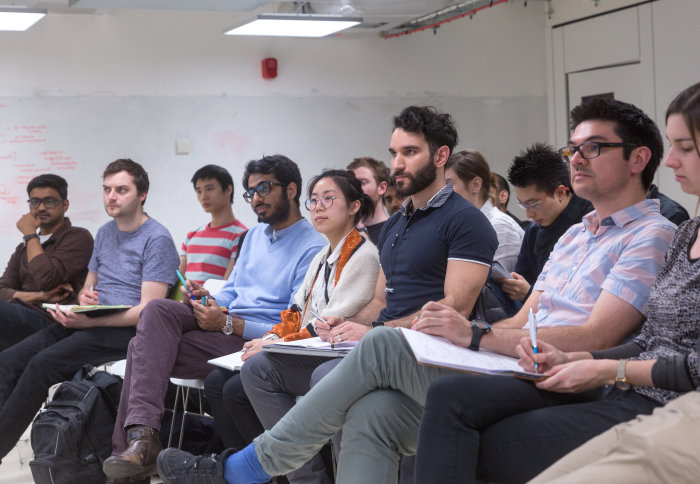'Speak up & seek support': non-traditional students share their tips for success

Three year study across two anonymous London universities uncovers success strategies used by high-achieving BAME, mature & working class students.
The research was carried out by Dr. Tiffany Chiu, Teaching Fellow in Educational Development in the Centre for Higher Education Research & Scholarship and Dr Billy Wong, University of Reading.

Over the course of three years thirty final year students were approached for a 90 minute interview with the research team. They were all identified as high-achieving non-traditional (HANT) learners due to their predicted First Class degree classification and their status as working class, BAME or mature students.
Dr Chiu and Dr Wong found that the students had used a wide variety of techniques to navigate their way through an environment that many felt was at best confusing, at worst hostile.
Dr Chiu sat down with Murray MacKay to discuss the paper's findings and what recommendations some of the students shared with her.
You identify ‘self-esteem, pride and fear’ as psychological barriers that often contribute to HANT students feeling that they are not welcome in higher education. In what ways does this manifest itself?
Based on our research as well as anecdotal evidence, self-esteem, pride and fear manifest themselves in many ways. Many of our students did not have positive experiences in school and often had self-doubt about their academic capability and performance. They had relatively little knowledge or available resources to support their higher education, which often resulted in a range of struggles.
Given this, it is not hard to imagine that non-traditional students often consider university is not for ‘people like them’, thereby feeling that they are not welcomed at university. I think this situation is even more intensified at institutions where there are fewer non-traditional students.
There is little research focusing on HANT students’ academic success. Why do you think this is?
Researchers often look at the problems, such as underachievement, and that is absolutely the right thing to do. The success stories are rarer and there are often just one or two stories to tell.
What we managed to do in our study is to take our time; we spent three academic years across two universities, and many programmes, and recruited an average of 10 academically successful students from non-traditional backgrounds each year. It takes a lot of time and effort to be able to collect the data we got and this ‘luxury’ is not always possible. Dr Wong and I were fortunate that this was a small pilot study that just happened to last three years.
You found that the students placed great importance on their 1st Year in higher education, yet 1st Year rarely counts toward students’ graduating grade.
At first glance, the importance they placed on their 1st Year learning does not seem to tally with that fact. From an educational perspective, we strongly believe in the value of the 1st Year experience and this often works out best when we provide students with a safe space to experience and learn from reflecting on their progress.
Both of the universities we visited have low-stakes assessment system in place for their 1st Year students. This greatly supports students to negotiate and aspire for higher achievement and a positive identity and hence, contributes to students' exploration of how the university system works.
Respondents wanted to feel independent. However this often took the form of not seeking support with academic or pastoral issues – how do you think this might be overcome?
There are a couple of ways to address this issue. First of all, fundamentally we need to get across to students that maintaining a reputation of being 'independent' does not necessarily mean that their learning is done in isolation and excluded from peers, teachers and any other support services.
Secondly, we should share our research findings with students. Specifically, a ‘can-do’ attitude should also include the simple but powerful idea of ‘just ask’. This is one of the tips provided by students, so other students might find their advice more relatable.
Ideally this support should be a central element of degree courses, in a similar way that academic study skills are built into the curriculum. This way, the pride or fear associated with seeking support could be lessened since conversations with staff would be 'normalised' as an expected part of degrees, like attending lectures or seminars. This also helps to address the apparent stigma of seeking support.
Are there any ‘quick wins’ that you think could be applied to assessment methods/support services?
I wouldn't say there are ‘quick wins’, as any kind of change takes time to take effect. However, what we can do is to support students to have the right mindset from the outset of their university journey.
This includes universities being transparent about our expectations. Often students are not sure about what is expected of them, especially those coming to university with relatively little prior knowledge of higher education. We should consider forms of assessment that support students to learn from experience, mistakes, and feedback.
Our students should be reminded that support services are available throughout their studies, not just at the point of induction or when they face challenges. We need to dispel the perception that seeking support is reserved for those who are desperate or dependent, and promote the importance of using support services as a key attribute of an independent student.
"‘Swallow your pride and fear’: the educational strategies of high-achieving non-traditional university students" by Tiffany Chiu & Billy Wong, published 13 May in British Journal of Sociology of Education
Article text (excluding photos or graphics) © Imperial College London.
Photos and graphics subject to third party copyright used with permission or © Imperial College London.
Reporter
Murray MacKay
Communications Division